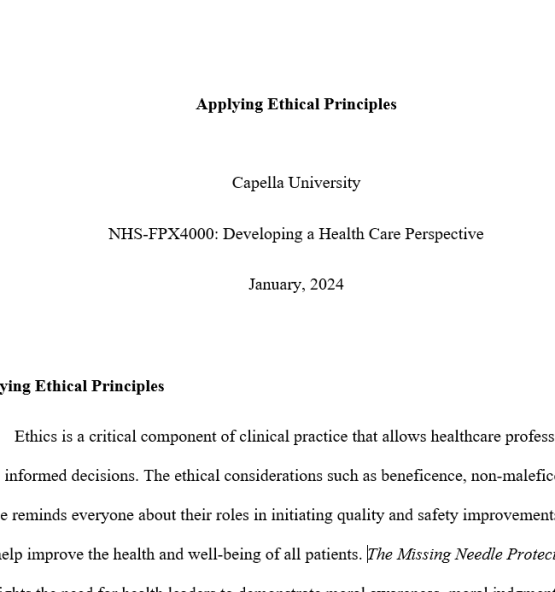
Applying Ethical Principles
Capella University
NHS-FPX4000: Developing a Health Care Perspective
January, 2024
Availability:In Stock
Ethics is a critical component of clinical practice that allows healthcare professionals to make informed decisions. The ethical considerations such as beneficence, non-maleficence, and justice reminds everyone about their roles in initiating quality and safety improvements plans that help improve the health and well-being of all patients. The Missing Needle Protector case highlights the need for health leaders to demonstrate moral awareness, moral judgment, and ethical behaviors when confronted by ethical dilemmas. Leaving an object in a patient’s belly is a serious mistake that requires leaders to understand the causes, consequences on patients and the organization, and the right actions steps to prevent harm.
The Missing Needle Protector highlights one of the likely risks within an operating room. The case also presents the challenges the healthcare team face when identifying the right actions steps after an error occurs. In this case, leaving a plastic needle protector in a patient’s belly portrays lapses that may cause other incidents if not addressed on time. The operating room supervisor acknowledged occurrence of the error. A conversation with the director of clinical services triggered further consultations with the scrub nurse and the chief of surgery to understand the events and the implications of leaving the object inside the patient’s belly. The director responded well by seeking more information from parties with the knowledge and experience necessary to make informed conclusion about appropriate interventions. The dilemma is making an ethical decision based on the patient’s interests and organization strategic priorities. This way, the case tests professionals’ ability to adhere to ethical principles that make them responsible and accountable for their actions.
The Missing Needle Protector guides healthcare professionals on the values of moral awareness, moral judgment, and ethical behavior. The three remind the care team about qualities and traits essential for making informed decisions when addressing issues within the clinical environment. Straight recognized moral awareness by responding positively to the report provided by the operating room supervisor. The director understood that such errors are likely to occur within the surgical unit and the need for adequate and complete information to understand the causes of the error. Moral judgment allows individuals to evaluate their behavior and actions and decide whether they are wrong or right (Borhani et al., 2021). Moral judgment means embracing well-thought out decision to make informed conclusions.
The director acknowledged the relevance of moral judgment by seeking information from the scrub nurse, the operating room supervisor, and the chief of surgery about the right action. The process meant that the leader understood consequences of his decision and the need to synthesize feedback from parties with the right knowledge, skills, and experiences (Borhani et al., 2021). Further, the scenario highlights the need for decisions driven by ethical behavior. Straight responded positively by seeking accurate and adequate evidence about the causes, consequences on patients, and implications of leaving the needle protector on the patient’s belly. This way, the leader considered alternatives and chose the one likely to protect the patient from harm.
Reviews
There are no reviews yet.